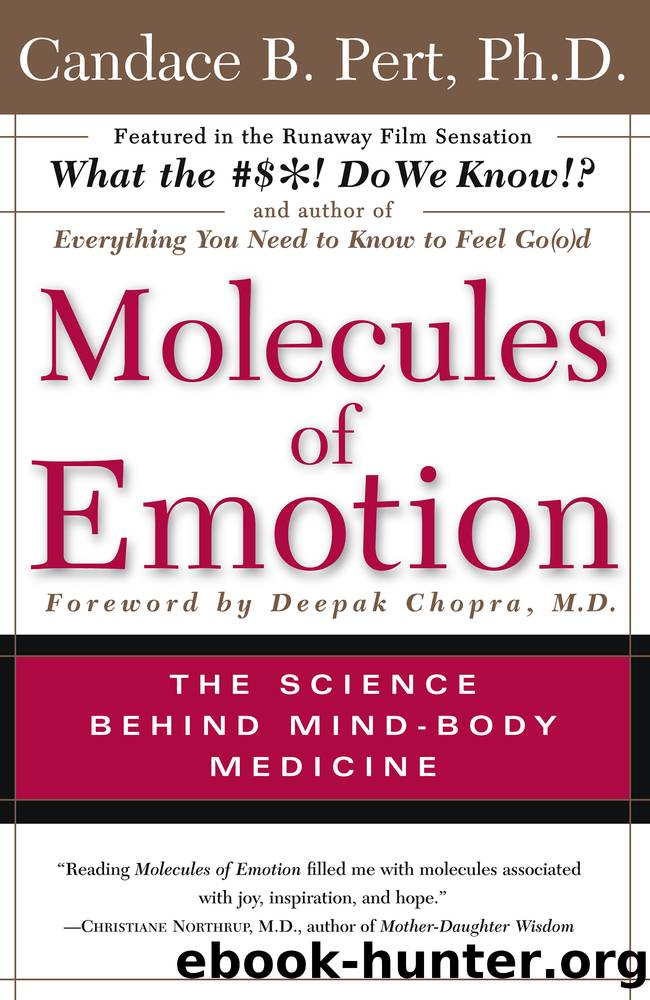Molecules of Emotion by Candace B. Pert

Author:Candace B. Pert
Language: eng
Format: epub
Publisher: Scribner
MIND IN BODY
The concept of a network, stressing the interconnectedness of all systems of the organism, has a variety of paradigm-breaking implications. In the popular lexicon, these kinds of connections between body and brain have long been referred to as âthe power of the mind over the body.â But in light of my research, that phrase does not describe accurately what is happening. Mind doesnât dominate body, it becomes bodyâbody and mind are one. I see the process of communication we have demonstrated, the flow of information throughout the whole organism, as evidence that the body is the actual outward manifestation, in physical space, of the mind. Bodymind, a term first proposed by Dianne Connelly, reflects the understanding, derived from Chinese medicine, that the body is inseparable from the mind. And when we explore the role that emotions play in the body, as expressed through the neuropeptide molecules, it will become clear how emotions can be seen as a key to the understanding of disease.
We know that the immune system, like the central nervous system, has memory and the capacity to learn. Thus, it could be said that intelligence is located not only in the brain but in cells that are distributed throughout the body, and that the traditional separation of mental processes, including emotions, from the body is no longer valid.
If the mind is defined by brain-cell communication, as it has been in contemporary science, then this model of the mind can now be seen as extending naturally to the entire body. Since neuropeptides and their receptors are in the body as well, we may conclude that the mind is in the body, in the same sense that the mind is in the brain, with all that that implies.
To see what this means in practice, letâs return for a moment to the example of the gut. The entire lining of the intestines, from the esophagus through the large intestine, and including each of the seven sphincters, is lined with cellsânerve cells and other kinds of cellsâthat contain neuropeptides and receptors. It seems entirely possible to me that the density of receptors in the intestines may be why we feel our emotions in that part of the anatomy, often referring to them as âgut feelings.â Studies have shown that excitement and anger increase gut motility, while contentment decreases it. And then, because this is a two-way network, itâs also the case that the movement of the gut as it digests food and excretes impurities can alter your emotional state. âDyspepticâ means grouchy and irritable, but originally it referred to having poor digestion. Or letâs look again at the autonomic nervous system, which runs all the unconscious aspects of your body, such as breathing, digestion, and elimination. You would think that if any part of the body functioned independently of the mind, it would most surely be the autonomic nervous system. There, the ability to make your heart beat, your intestines digest, and your cells replicate is carried on below conscious awareness.
Download
This site does not store any files on its server. We only index and link to content provided by other sites. Please contact the content providers to delete copyright contents if any and email us, we'll remove relevant links or contents immediately.
Machine Learning at Scale with H2O by Gregory Keys | David Whiting(4313)
Never by Ken Follett(3956)
Harry Potter and the Goblet Of Fire by J.K. Rowling(3857)
Fairy Tale by Stephen King(3396)
Unfinished: A Memoir by Priyanka Chopra Jonas(3389)
The Man Who Died Twice by Richard Osman(3078)
Will by Will Smith(2919)
It Starts With Us (It Ends with Us #2) by Colleen Hoover(2367)
Rationality by Steven Pinker(2363)
Can't Hurt Me: Master Your Mind and Defy the Odds - Clean Edition by David Goggins(2341)
The Dark Hours by Michael Connelly(2307)
The Storyteller by Dave Grohl(2236)
Friends, Lovers, and the Big Terrible Thing by Matthew Perry(2230)
The Dawn of Everything: A New History of Humanity by David Graeber & David Wengrow(2208)
The Becoming by Nora Roberts(2201)
The Stranger in the Lifeboat by Mitch Albom(2121)
Cloud Cuckoo Land by Anthony Doerr(2112)
Love on the Brain by Ali Hazelwood(2078)
Einstein: His Life and Universe by Walter Isaacson(2022)
